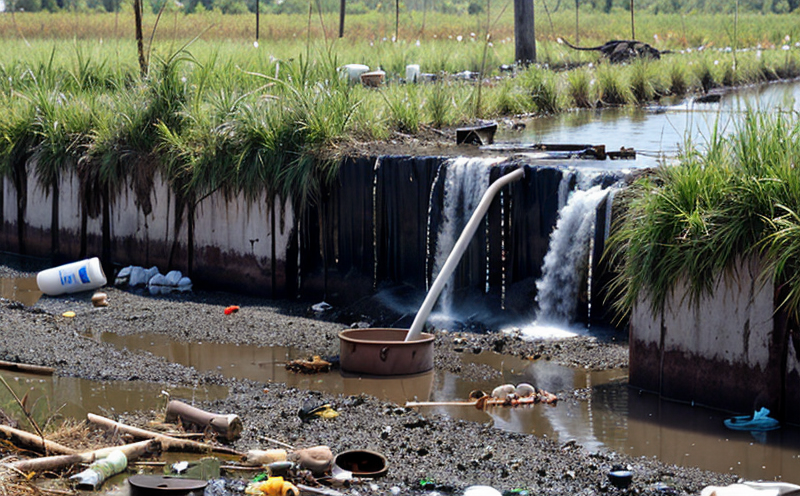Environmental Pollutant Testing
The environmental pollutant testing category is crucial in ensuring compliance with local and international regulations aimed at safeguarding public health and ecosystems. Environmental pollutants can originate from various sources such as industrial emissions, agricultural practices, consumer products, and waste management processes. Accurate and reliable testing of these pollutants is essential for identifying the presence, concentration levels, and potential impacts on air, water, soil, and other environmental media.
Our laboratory adheres to international standards such as ISO 17025 for quality assurance and uses state-of-the-art instrumentation to conduct precise analyses. We employ a multidisciplinary team of experts who have extensive experience in the field of environmental pollutant testing. Our comprehensive approach ensures that our clients receive accurate, reproducible results.
Testing methods include but are not limited to GC-MS (Gas Chromatography-Mass Spectrometry), LC-MS/MS (Liquid Chromatography-Tandem Mass Spectrometry), ICP-MS (Inductively Coupled Plasma Mass Spectrometry), and AAS (Atomic Absorption Spectroscopy). These methods are used for the detection of a wide range of pollutants including heavy metals, pesticides, volatile organic compounds (VOCs), polychlorinated biphenyls (PCBs), dioxins, furans, and endocrine-disrupting chemicals.
The process typically begins with sample collection from various environmental matrices such as air, water, soil, and biota. Sample preparation involves a series of steps that depend on the specific pollutant being analyzed. This may include filtration, extraction, derivatization, concentration, or dilution. Once prepared, samples are subjected to rigorous testing using our high-precision instruments.
Our laboratory ensures strict adherence to standard operating procedures (SOPs) and quality control measures to maintain consistency and reliability of results. The data generated from these tests is used by regulatory bodies, environmental agencies, and industry stakeholders to make informed decisions regarding pollution control strategies, product development, and waste management practices.
The importance of environmental pollutant testing cannot be overstated. It plays a pivotal role in monitoring the effectiveness of mitigation measures, assessing risks, and providing scientific evidence necessary for policy formulation and enforcement. By leveraging our expertise and advanced technologies, we aim to contribute significantly towards sustainable development goals.
Industry Applications
- Regulatory Compliance: Ensuring compliance with local and international environmental regulations.
- Risk Assessment: Identifying potential risks associated with pollutants in various environments.
- Product Development: Evaluating the impact of new products on the environment during their lifecycle.
- Waste Management: Assessing and managing waste streams to minimize environmental impacts.
- Agricultural Practices: Monitoring the effects of agricultural activities on soil, water, and air quality.
- Consumer Products: Testing for harmful substances in consumer goods before they reach the market.
Quality and Reliability Assurance
The reliability and accuracy of environmental pollutant testing are paramount. We employ a robust quality management system that adheres to ISO 17025 standards, which ensures consistent performance across all our services. Our team undergoes continuous training to stay abreast with the latest techniques and methodologies.
Our laboratory is equipped with cutting-edge equipment such as GC-MS, LC-MS/MS, ICP-MS, and AAS that are regularly calibrated and maintained by certified personnel. Regular proficiency testing and internal audits further enhance our ability to provide reliable results.
We maintain stringent quality control measures at every stage of the testing process from sample receipt through analysis to report generation. This includes rigorous validation studies for new methods, strict adherence to standard operating procedures (SOPs), and robust data management practices.
Our commitment to quality extends beyond technical proficiency; it encompasses ethical considerations ensuring that our tests do not compromise public health or the environment. We strive to deliver unbiased, transparent results that are both credible and actionable.
Use Cases and Application Examples
Case Study 1: A major chemical manufacturer sought assurance regarding the environmental impact of its new production process. Our laboratory conducted extensive testing on air samples collected downwind from the plant. The results indicated acceptable levels of pollutants, thereby providing reassurance to the company.
Case Study 2: An agricultural cooperative wanted to ensure that their fertilizers did not pose risks to nearby water bodies. We tested soil and runoff water samples for nitrate and phosphate content. Our findings helped them modify their application rates to reduce nutrient runoff.
Case Study 3: A city council aimed at improving air quality by implementing stricter emission controls on vehicles. Our laboratory provided comprehensive emissions testing data which was instrumental in formulating effective policies.





